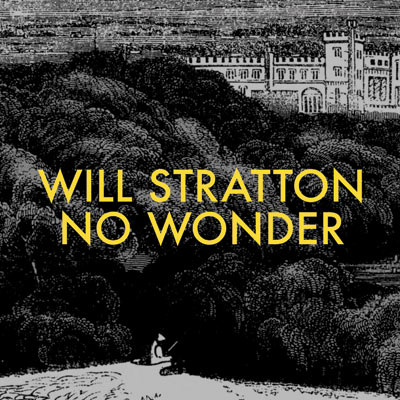
Will Stratton
No Wonder
(Stunning Models on Display; 2009)
By Conrad Amenta | 25 November 2009
No Wonder is—for fans of Owen and Nick Drake, of Sondre Lerche before he pitched headlong into the extravagances of singer-songwriterdom, of yearning for the perpetual gush of unapologetic naiveté—more of the earnestness and bittersweetness that Will Stratton offered up so much of on What the Night Said (2007). That, combined with the fact that there’s a song here called “Your California Sky,” offers to the more cynical among us (say, for those who think Owen is the embarrassing Kinsella) easy targets. Heart worn clearly on sleeve, Stratton dares you to bullseye his time worn formula from the internet’s many virtual peanut galleries. You can practically see the dew collecting in the corners of giant cartoon doe eyes as Stratton sings.
Until about the see-saw strings on “Who Will,” the first of what are ostensibly fourteen utterly convincing acoustic ballads and the occasionally fuzzed up retrograde rocker, filled with so many of such balanced gestures of restrained songwriting that one realizes there might actually be people who are good at writing love songs without being ironic or allusive. Throughout, the listener is confronted with the self-eating epithet that romance isn’t really dead, just drowned out and made horribly cliché and locked away by it various hysterical simulations, and that music like this is somehow more faithful to something elusive and appealing. There’s no way No Wonder will compete in the industry that romantic writing has become, but then there’s those strings again, or the solitary beam of trumpet on “For Fanny Glass,” so strategically accenting the mix. The album renders its own quiet rejoinder to those who might insist upon its anachronism, even if it’s doomed to mouthing truths in a slaughterhouse.
We do eventually get the obligatorily upbeat tracks, the first of which is slotted just outside the obvious first three slots, “You’re a Real Thing,” where if you listen closely you can actually hear feedback—again, so low in the (perfectly produced) mix—that it sounds like simply more of Stratton’s comprehensively intuitive songwriting. He also approaches genuine perspective, singing “The young ones wish that they were younger / so that they wouldn’t feel the way they do / and the youngest wish that they were older / cos the young ones they all look so cool with their / tired eyes and their sleeves full of lies […] and the oldest wish they were no longer / so that they wouldn’t see what the world comes down to.” Somewhere in there Stratton’s bordering on a kind of wisdom, evoking this music’s better histories, though his polish obscures, somewhat, the folky tendency to toss romance onto its natural flipside of dire straights and looming dread. Stratton doesn’t seem invested in folk’s evil energies yet, but his poke at “everything-simply-is!” commentary is a half step on the way. “Judas 1966,” it turns out, is the other half of that first step, contemporizing Jesus and parable. (Again.)
It’s no blazed trail, nor does it ever really seek to convince its listener of newness. What No Wonder is, simply, is a lovely, humble, mature record from a person who seems like a lovely, humble, mature human being. Songs like “For No One” won’t cease the rotation of eyeballs in the sockets of neo-whatever fans and ironists, and Stratton still seems to forbear from (rather than outright lack) the occasional rawness and true fragility to make a fully formed statement. He’s no young Dylan, that tragic figure we seem to demand of every young man with an acoustic guitar, but when the best to which one can aspire is emulation then a record with this kind of polish and easiness isn’t to be so flippantly overlooked.





